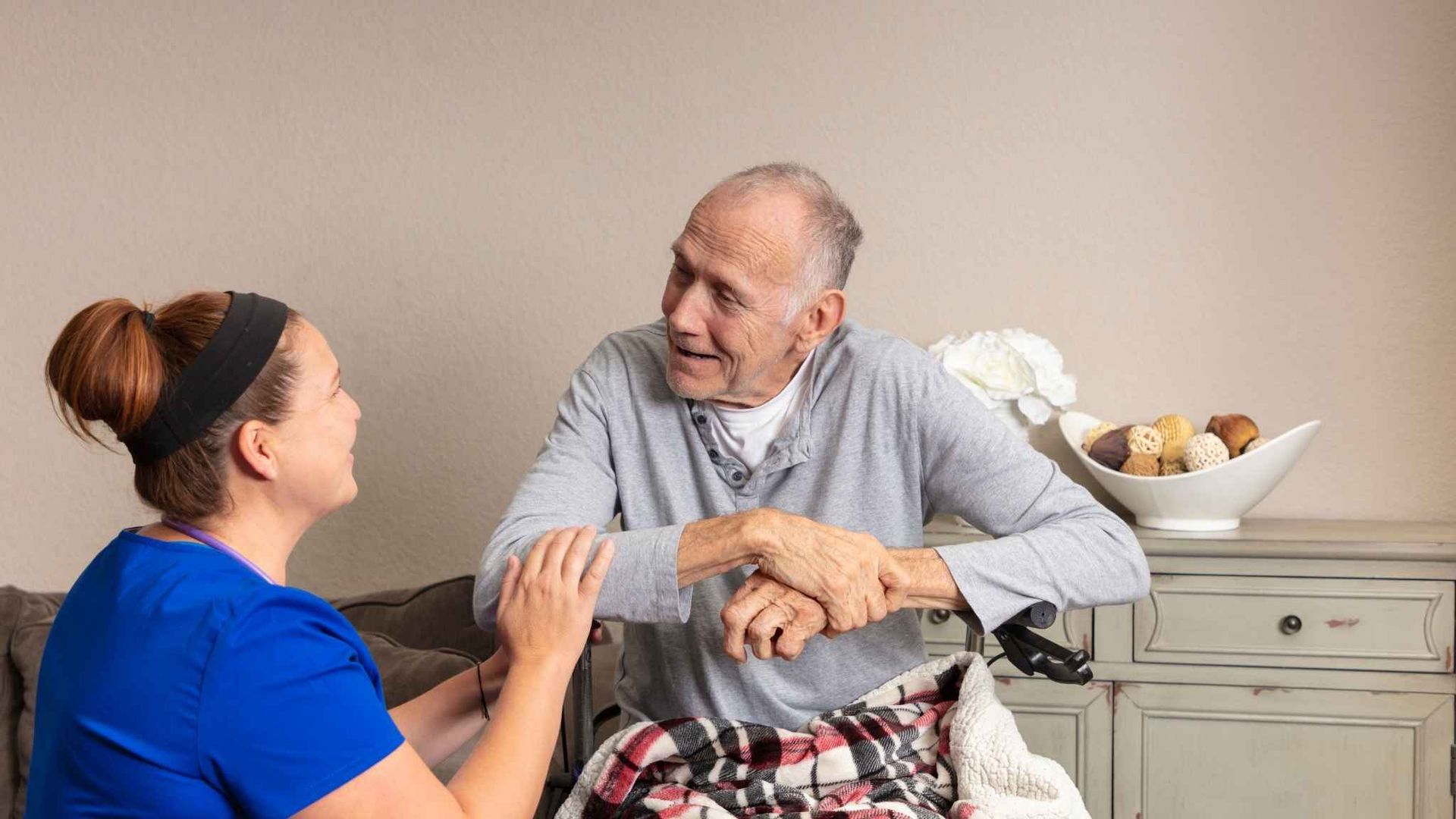Does Hospice Cover 24-Hour Care at Home?
It is common to picture hospice care as a constant bedside presence, but the way support is provided at home works differently. Many families wonder if hospice covers 24-hour care at home.
In this article, we'll explain what to expect about hospice care at home, when round-the-clock care may be offered, and what additional options families can explore when looking for more continuous support.
What Does Hospice Typically Provide at Home?
Home hospice care usually includes regular nurse visits to monitor your loved one's symptoms, aides who assist with personal care, and social workers or chaplains who offer emotional and spiritual support. Visits are scheduled based on needs, and team members rotate in and out rather than staying at the home full-time.
Because hospice care is structured this way, families often provide most of the daily, hands-on care themselves. Family members help with meals, medication reminders, and sit by the bedside at night. The hospice staff guides you through these responsibilities, making sure you don't feel alone during this difficult time.
This balance between professional visits and family caregiving allows patients to stay in a familiar environment while still receiving expert care. Understanding how the care team works alongside you helps set realistic expectations.
Can Hospice Cover Full-Time Support?
In most cases, standard hospice care at home does not include a caregiver who stays beside your loved one throughout the day. The hospice team visits on a regular schedule but does not remain in the home around the clock.
However, hospice programs may offer what is called continuous home care for short periods when symptoms become severe or during a medical crisis. During these times, a nurse or aide may stay in the home for extended hours (typically 8 to 24 hours) until the condition stabilizes.
The question of whether hospice covers 24-hour care at home depends on the specific circumstances and severity of symptoms. Medicare and most insurance plans cover this level of care only in specific crisis situations requiring intensive symptom management.
According to Medicare guidelines, qualifying situations include:
- Uncontrolled pain that does not respond to regular treatment
- Severe shortness of breath or breathing difficulties
- Restlessness or agitation that makes the patient unsafe or uncomfortable
- Ongoing severe nausea or vomiting
The care plan is evaluated daily to determine if continued support is still needed.
Who Pays for Extended Hospice Support at Home?
Medicare and most insurance plans cover standard hospice services provided at home, including part-time visits from hospice staff and medical equipment such as hospital beds, oxygen, or medications that ease symptoms.
Extended hours beyond crisis-level continuous care are usually not included in standard hospice benefits. In these situations, families can choose to pay privately for additional support. Many hire private-duty caregivers, either through an agency or independently, to stay in the home and provide help with daily needs.
Options for Additional In-Home Support
Families who need more consistent presence at home often turn to:
- Private-duty caregivers can stay for extended shifts and provide help with personal care, meals, and companionship. They offer flexibility in scheduling and can be hired for specific times when family members are unavailable.
- In-home care agencies provide trained staff with flexible schedules, making it easier to arrange support when needed. These agencies typically handle hiring, background checks, and scheduling coordination.
- Respite care gives family caregivers the chance to rest or attend to other responsibilities while knowing their loved one is safe and cared for. This can be arranged for a few hours or several days.
These services work alongside hospice rather than replacing it. They fill in the spaces between scheduled hospice visits, allowing the team's medical expertise to go hand-in-hand with the consistent support families often need. Your hospice social worker can recommend trusted local providers.
Planning for Overnight Care
When a loved one is facing a terminal illness, the hardest hours are often in the middle of the night. Symptoms can feel more intense, and caregivers may feel exhausted after spending the day providing care. Most hospice programs do not provide staff to stay overnight unless there is a need for continuous care during a medical crisis.
Planning ahead for nighttime needs can make these hours feel more manageable. Consider who will monitor your loved one's care, how medications will be administered, and what to do if symptoms worsen. Your hospice team provides a 24/7 phone line for urgent questions or concerns that arise during the night, and a nurse can visit if the situation requires it.
Having a clear plan for the nights brings peace of mind and ensures caregivers know how to access support when needed.
Talking to Your Hospice Team About Care Needs
Caring for a loved one at home can feel rewarding, but it can also be physically and emotionally exhausting. If you are worried about the demands of caregiving, bring these concerns to your hospice team. They want to understand what you are experiencing so they can support both you and your loved one more effectively.
Hospice social workers are especially helpful in coordinating care. They can help you set up a family caregiving schedule, suggest ways to share responsibilities among family members, connect you with community resources, and arrange respite care when rest is needed.
Being open about your needs gives the team the opportunity to provide practical solutions and ease the weight of caregiving.
Choosing What Works for Your Family
Each family's situation is different, which means care plans should be customized to fit what works for you and your loved one. Consider your loved one's wishes, the capacity of family caregivers, available financial resources, and how the home is set up to support comfort and safety.
Some families rely mainly on hospice visits and family caregiving, while others bring in additional hired caregivers to create a stronger support network. Either approach can be meaningful when chosen thoughtfully.
Asking for help is not a failure. It is a reflection of your deep love and commitment to your loved one's comfort and well-being.
Let Valley Oaks Help You Plan for Support at Home
Every family's journey with hospice care is unique, and it helps to have a trustworthy team by your side. At Valley Oaks, we take the time to listen to your concerns, explain your options, and work with you to create the right plan of care for your loved one.
If you're still wondering whether hospice covers 24-hour care at home or have other questions about your care options, our team is ready to help. We'd love to talk through your family's needs.












